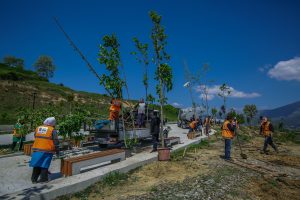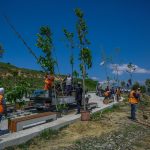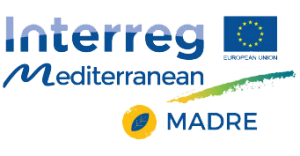01/2016
In 2016, the Municipality of Tirana launched the Plan “Go Tirana 2016-2026 Smart City”, which includes the rehabilitation of clear cut and degraded forests in the the Green Belt of Tirana through the planting of 50 hectares of fruit trees. The Green Belt of Tirana covers an area of 40,000 hectares and is inhabited and/or visited by roughly 1 million people annually. The plantation of a continuous belt of fruit and decorative trees is planned to expand the green surface around the city and ensure territorial cohesion.
Contact details
Outskirts of Tirana (area of Farkë), Albania
Stakeholders
∙ Tirana Parks and Recreation Agency
∙ Municipality of Tirana
∙ Farmers and farmers associations
∙ Donors
Objectives
∙ Rehabilitating clear cut and degraded areas of the Green Belt of Tirana, as well as existing parks
∙ Increasing the green surface per inhabitant ratio in Tirana, mobilising public and private land
∙ Establishing a real and functional Green Belt in the city outskirts to improve air quality and maintain biodiversity
∙ Enabling the development of recreational activities, including hiking, trail running, mountain climbing, etc.
Legal framework & Budget
The project is implemented by Tirana Parks and Recreation Agency.Activities
The project involves the planting of shrubs and fruit trees to control soil erosion, steep slope works, and reinforcements with concrete belts and panels with stones in gabion. To increase the green surface, the Municipality is also financing the plantation of fruit trees in private gardens of houses that have recently been built in the area, in agreement with inhabitants. The project started in 2016 in the area of Farkë, a recently urbanised area on the outskirts of Tirana.>Innovation & Outcomes
This project is innovative as it rehabilitates and maintains a green area that is subject to illegal dwelling. By involving existing dwellings, the Municipality shows its will to keep the integrity of the area, to reduce the fragmentation of green space and to protect recreational parks in Tirana. The project is in the first stage of implementation: it started in December 2016.500 000
1 200 000
Main obstacles & Next steps
The main obstacle faced by the project was to reach a common agreement with all private owners regarding the surface to be planted, the type of fruit trees, etc. It was overcome thanks to the intervention and political will of the Municipality of Tirana. In the future, the area will be provided with new recreational infrastructure for the population of Tirana.More on :
http://www.tirana.al








